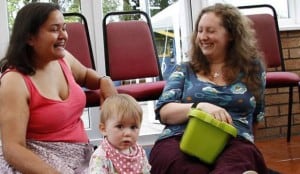LLL is aware that throughout time mothers in many cultures have informally shared their breastmilk and wet nursed among family members and trusted friends. We know that in times of severe maternal illness, death and natural disaster sharing breastmilk can be lifesaving.
The World Health Organisation states that if a mother’s own milk is not available then the next best thing is the milk of another woman (1). La Leche League fully supports the use of human milk for babies. We aim to help mothers breastfeed their babies; we also seek to help mothers express and safely store their own milk for their babies. When mothers can’t provide sufficient breast milk themselves we provide information and support to help them find a safe alternative.
Can I increase my own supply?
Some techniques to try:
- Increase frequency of nursing
- make sure the baby is latched on correctly
- offer both breasts at each feeding
You might also find useful information on our page Is My Baby Getting Enough Milk? and in Further Reading.
In rare circumstances mothers are unable to provide their baby with a full supply of breast milk. Human milk banks provides pasteurised, screened donor milk, which is a good alternative.
There are documented benefits and risks to informal milk sharing. Benefits of breast milk include, but are not limited to:
Risks of sharing breast milk can include, but are not limited to:
- transmission of certain infectious agents, like bacteria or viruses, some of which may be found in milk expressed by asymptomatic women
- medicines and other drugs
- environmental contaminants as a result of unhygienic storage and handling of unprocessed donated milk
LLLGB suggests that mothers who wish to obtain breast milk contact licensed human milk banks, or another regulated and medically supervised human milk collection centre.
Licensed milk banks require donors to meet specific health requirements before accepting their donated milk. The milk is screened and treated for viruses to eliminate undetected infections it might contain.
Women who wish to donate their breastmilk to others can request complete information from a milk bank about how her milk will be used, and she may be able to restrict how it will be used.
An LLL Leader may provide contact information for non-profit human milk banks, other regulated collection centers, and formal/medically supervised or informal milk-sharing networks but cannot set up or facilitate any type of milk-sharing network.
Further Reading
Is My Baby Getting Enough Milk?
Amazing Milk
Beginning Breastfeeding
Nursing Supplementers
Expressing Your Milk
Storing Your Milk
LLLI information and policy on milk sharing
In Praise of at-breast supplementers – a mother’s story from Breastfeeding Matters
Other websites
Human Milk for Human Babies (HM4HB), the Informed milksharing network
References
WHO Infant and Young Child Nutrition [1] http://apps.who.int/gb/archive/pdf_files/WHA55/ea5515.pdf
Written by Anna Burbidge

